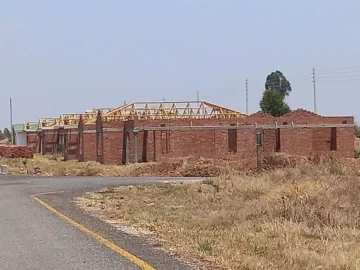
ACROSS Zimbabwe’s urban landscape, a patchwork of low-income housing schemes paints a picture of both hope and hardship.
These government-initiated projects aim to provide affordable shelter for the country’s poorest citizens, but the reality on the ground is often far from ideal.
The dream of a secure, permanent home lures many Zimbabweans to these schemes.
However, the council waiting list for low-income homeseekers has left many with little or no hope of owning a home and some have suggested the removal of a waiting list fee.
According to Zimbabwe National Statistics Agency (ZimStat), the country is facing a housing crisis that has left nearly half of its urban population of almost 5,7 million people living in rented accommodation.
According to the ZimStat 2022 housing and population census, the national housing waiting list stands at over two million.
President Emmerson Mnangagwa promised to reduce the country’s housing backlog during the 2018 election campaign, but so far there has been little progress.
In the 2018 election manifesto, Zanu PF announced an ambitious project to construct 1,5 million housing units by 2023, translating to 300 000 houses per year, or 25 000 a month, 6 250 a week or 822 houses a day.
- Corruption Watch: Get scared, 2023 is coming
- Corruption Watch: Get scared, 2023 is coming
- Letters: Ensuring Africa’s food security through availability of quality seeds
- Is military's involvement in politics compatible with democracy?
Keep Reading
If the plan was successful, over 1,2 million houses would have been constructed to date.
In the 2019 Infrastructure Investment Plan drafted by the Finance and Economic Development ministry, the government announced that it would invest US$264 million in residential housing construction.
Government announced it would devise a financing strategy to provide low-cost serviced land for housing development in partnership with the Infrastructure Development Bank of Zimbabwe and the Urban Development Corporation.
However, nothing has materialised with the majority still living in rented accommodation.
Personal assistant in the Local Government ministry, Silvester Chin’anga, said there was a need for a long-lasting solution to the housing crisis.
“Regarding the issues of waiting lists, people have been on waiting lists for a long time, which is true but when did the local authorities last construct their own houses to allocate people,” Chin’anga said.
Chin’anga was speaking at the Local Governance Learning and Exchange Summit (LGLExS) hosted by the Alliance of Community Based Organisations (ACBOS) recently.
“Let’s engage and find a solution to what we believe we can do.
“Remember there are some dangers coming with introducing new ideas and if there is no waiting list how will you know who came first or second in that order.”
Local authorities grappling with economic constraints and corruption are struggling to complete construction projects on time or within budget.
This leaves beneficiaries stranded in unfinished structures, vulnerable to the vagaries of weather and crime.
Even when completed, many low-income housing units lack basic amenities like running water and proper sanitation.
Residents rely on communal taps and pit latrines, posing health risks and raising hygiene concerns, especially for young children.
The infrastructure, often poorly constructed or maintained, deteriorates rapidly, adding to the residents' woes, especially persons with disabilities.
As the housing crisis persists, land barons have been taking advantage of desperate homeseekers, illegally selling them unserviced land even on wetlands.
Some of the beneficiaries have been left counting losses as local authorities have not hesitated to demolish illegally built housing structures.
In an interview with NewsDay, ACBOS project co-ordinator Merjury Mhlanga said: “The housing allocation process is largely shrouded in opaqueness which creates opportunities for corruption.”
“As CBOs we continue to engage with our local authorities so that they adhere to the existing transparency mechanisms.
“Section G1 of the Manual for the Management of Urban Land specifies that all councils are obliged to maintain waiting lists which should be updated annually and everyone on the waiting list should be open to public inspection.”
One woman from Bindura who spoke to NewsDay on condition of anonymity said she had been on the housing waiting list since 2017.
“I have been on the waiting list since 2017 and my subscriptions are up to date but we see people coming from as far as Bulawayo to get stands through corruption,” she said.
“I think local authorities should introduce laws which promote transparency and accountability going forward.”
Rentals continue to increase at a rate much higher than wages, leaving individuals and families with limited options.
As a result, they are often forced to settle for substandard living conditions or spend a significant portion of their income on rent, leaving little room for other basic necessities.
Mhlanga said public inspection was important in enhancing the transparency of the housing allocation process.
“As CBOs, we continue to engage local authorities on this as this will strengthen monitoring mechanisms. As CBOs, we also empower communities to engage duty bearers using research backed advocacy,” she added.
Nkomwa Foundation Trust advocacy officer Norman Mudadisi told NewsDay that the payment conditions for low-income houses are not favourable to people with disabilities (PWDs) as few can afford to pay subscriptions.
“The main issue is the poverty and the background of PWDs as most of them are less privileged,” Mudadisi said.
“I propose that the government should have a reasonable payment plan for PWDs to ensure inclusivity.”











